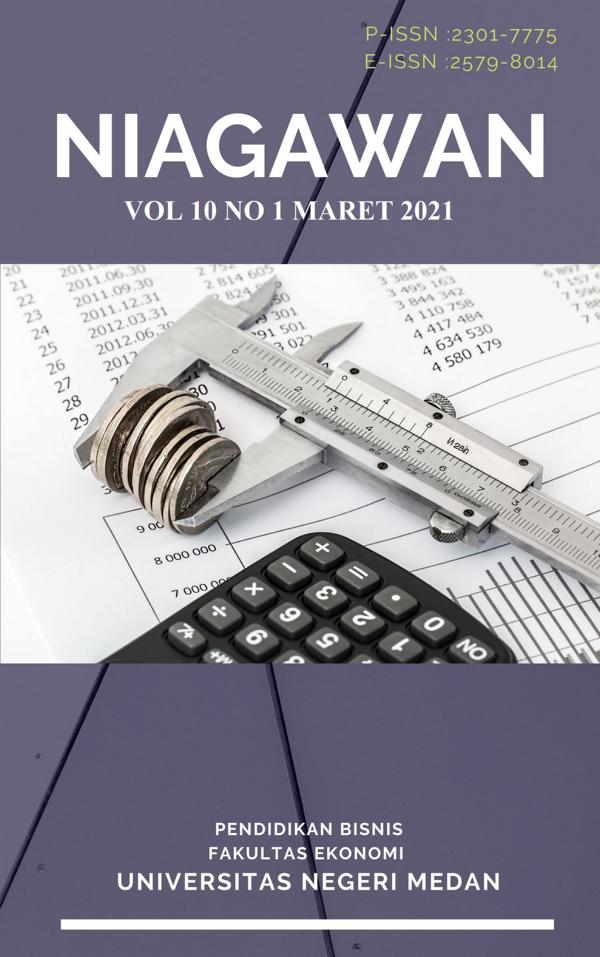INDONESIAN GOVERNMENT POLICY AND SMEs BUSINESS STRATEGY DURING THE COVID-19 PANDEMIC
DOI:
https://doi.org/10.24114/niaga.v10i1.21813Keywords:
COVID-19, Business, Policy, StrategyAbstract
Economic disruption by The COVID-19 pandemic has hit Indonesian economic heavily. The purpose of this study is to provide an overview of government policies and business strategies in Indonesia amid the COVID-19 pandemic. This study employed a qualitative approach with data sources of literature reviews. The results of the study indicate that the Indonesian Government has responded to the pandemic by issuing some policies regarding SMEs. There are several policies issued regarding the Micro and SMEs business. The policy is breakdown into five schemes namely (1) Social support; (2) SMES tax incentives; (3) Credit restructuring and relaxation (4) Working capital support stimulus; and (5) Collaboration with State-owned enterprise as the off-taker for SMES products. On the other hand, there are some SMES business strategies in adjusting amidst the Covid-19 pandemic in Indonesia. Those strategies are (1) Products innovation; (2) Customer and stakeholder relationship management;(3) Digital marketing and distribution; and (4) Strategic Agility.References
Agus Setiono, B. (2020). Strategi Bertahan Bagi UKM Hadapi Krisis Akibat Covid-19.
Aris, N. M. (2007). SMEs: Building blocks for economic growth. Department of National Statistics, Malaysia.
Casalino, N., De Marco, M., & Rossignoli, C. (2015). The extensiveness of manufacturing and organizational processes: an empirical study on workers employed in the European SMEs. In Smart Education and Smart e-Learning (pp. 469“479). Springer.
Gerald, E., Obianuju, A., & Chukwunonso, N. (2020). Strategic agility and performance of small and medium enterprises in the phase of Covid-19 pandemic. International Journal of Financial, Accounting, and Management, 2(1), 41“50.
Hanum, A. N., & Sinarasri, A. (2018). Analisis faktor-faktor yang mempengaruhi adopsi e commerce dan pengaruhnya terhadap kinerja umkm (studi kasus umkm di wilayah kota semarang). MAKSIMUM, 8(1).
Hu, M.-W. (2010). SMEs and economic growth: entrepreneurship or employment. ICIC Express Letters, 4(6), 2275“2280.
Kumala, R., & Junaidi, A. (2020). Strategi Bisnis Dan Pemanfaatan Kebijakan Pajak Di Masa Pandemi COVID-19 Dan Era New Normal (Studi Kasus Pelaku UKM Marketplace). Prosiding Seminar STIAMI, 7(2), 98“103.
Kwaku, A., & Satyendra, S. (1998). Customer orientation and performance: a study of SMEs. Management Decision, 36(6), 385“394. https://doi.org/10.1108/00251749810223592
Lasagni, A. (2012). How Can External Relationships Enhance Innovation in SMEs? New Evidence for Europe*. Journal of Small Business Management, 50(2), 310“339. https://doi.org/10.1111/j.1540-627X.2012.00355.x
Lee, I. H., & Marvel, M. R. (2009). The moderating effects of home region orientation on R&D investment and international SME performance: Lessons from Korea. European Management Journal, 27(5), 316“326. https://doi.org/10.1016/j.emj.2009.04.011
Liguori, E. W., & Pittz, T. G. (2020). Strategies for small business: Surviving and thriving in the era of COVID-19. Journal of the International Council for Small Business, 1“5.
Loayza, N. V, & Pennings, S. (2020). Macroeconomic policy in the time of COVID-19: A primer for developing countries. World Bank.
Marlinah, L. (2020). Peluang dan Tantangan UMKM Dalam Upaya Memperkuat Perekonomian Nasional Tahun 2020 Ditengah Pandemi Covid 19. JURNAL EKONOMI, 22(2), 118“124.
Mavengere, N. (2013). Information systems role in strategic agility: A supply chain context.
Nugraheni, A. P., Pramudyastuti, O. L., & Sunaningsih, S. N. (2020). STRATEGY OF SMEs IN THE COVID-19 PANDEMIC PERIOD. Jurnal Akuntansi & Perpajakan Jayakarta, 2(1), 45“52.
OECD. (2020). SME Policy Response. https://read.oecd-ilibrary.org/view/?ref=119_119680-di6h3qgi4x&title=Covid-19_SME_Policy_Responses
Pakpahan, A. K. (2020). COVID-19 DAN IMPLIKASI BAGI USAHA MIKRO, KECIL, DAN MENENGAH. Jurnal Ilmiah Hubungan Internasional. https://doi.org/10.26593/jihi.v0i0.3870.59-64
Rahman, R. (2020). 37,000 SMEs hit by COVID-19 crisis as Government prepares aid. April. https://www.thejakartapost.com/news/2020/04/16/37000-smes-hit-by-covid-19-crisis-as-government-prepares-aid.html
Shin, H., Lee, J. N., Kim, D., & Rhim, H. (2015). Strategic agility of Korean small and medium enterprises and its influence on operational and firm performance. International Journal of Production Economics, 168, 181“196. https://doi.org/10.1016/j.ijpe.2015.06.015
Tallon, P. P., & Pinsonneault, A. (2011). Competing perspectives on the link between strategic information technology alignment and organizational agility: insights from a mediation model. Mis Quarterly, 463“486.
Tambunan, T. (2008). SME development, economic growth, and government intervention in a developing country: The Indonesian story. Journal of International Entrepreneurship, 4(6), 147“167.
Venkatesh, V. (2020). Impacts of COVID-19: A research agenda to support people in their fight. International Journal of Information Management, 102197.
Yun, J. J., Jung, W., & Yang, J. (2015). Knowledge strategy and business model conditions for sustainable growth of SMEs. Journal of Science & Technology Policy ManagementManagement, 6(3), 246“262
Downloads
Published
Issue
Section
License
Authors who publish in this journal agree to the following terms:
- Authors retain copyright and grant the journal the right of first publication, with the work simultaneously licensed under a Creative Commons Attribution License that allows others to share and adapt the work with an acknowledgment of the work's authorship and initial publication in this journal.
- Authors can enter into separate, additional contractual arrangements for the non-exclusive distribution of the journal's published version of the work, with an acknowledgment of its initial publication in this journal.
- Authors are permitted and encouraged to post their work online before and during the submission process, as it can lead to productive exchanges and earlier and greater citation of published work. Where authors include such work in an institutional repository or on their website, we request that they include a statement acknowledging the Jurnal Perspektif Pembiayaan dan Pembangunan Daerah, including the name of the journal, the volume number, and a web link to the journal item.
- Authors should be aware that the Creative Commons Attribution 4.0 International License (CC BY 4.0) permits readers to share (copy and redistribute the work in any medium or format) and adapt (remix, transform, and build upon the work) for any purpose, even commercially, provided they also give appropriate credit to the work, provide a link to the license, and indicate if changes were made. They may do these things reasonably but not in any way that suggests the author or the publisher endorses their use.
NIAGAWAN by Program Studi Pendidikan Bisnis Fakultas Ekonomi Universitas Negeri Medan is licensed under CC BY-NC 4.0





